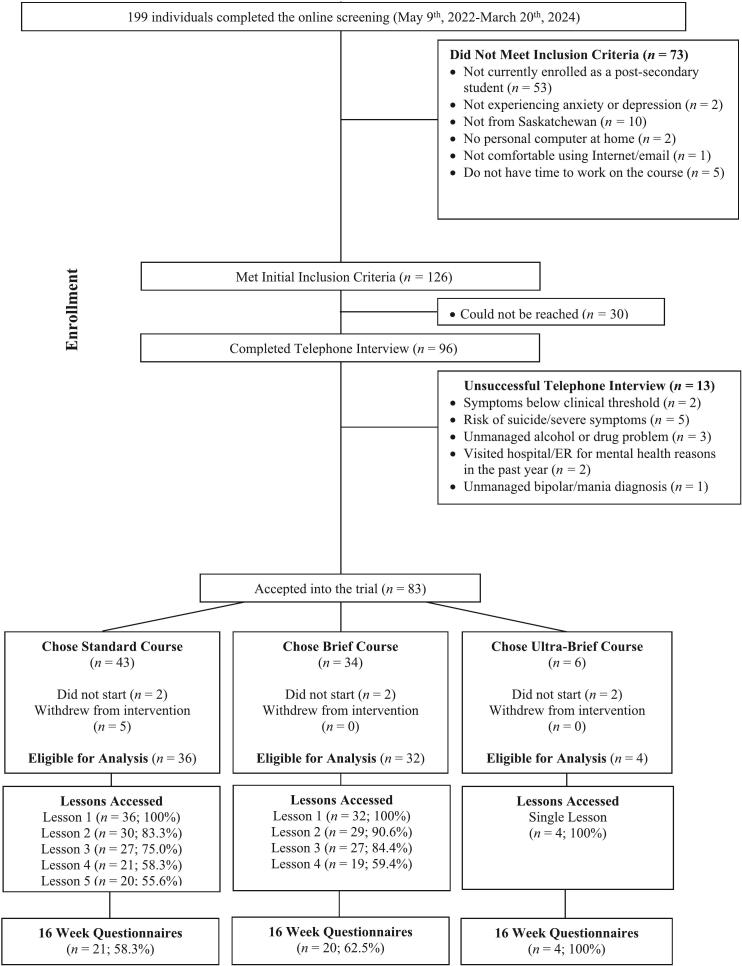Internet-delivered cognitive behaviour therapy for university students: Preference trial for various course durations
IF 4.1
2区 医学
Q1 HEALTH CARE SCIENCES & SERVICES
Internet Interventions-The Application of Information Technology in Mental and Behavioural Health
Pub Date : 2024-12-06
DOI:10.1016/j.invent.2024.100796
引用次数: 0
Abstract
Background
Internet-delivered cognitive behaviour therapy (ICBT) is an accessible and effective treatment option for post-secondary students, but engagement and completion rates are less favourable than in non-student populations in routine care. Studies on students' treatment preferences suggest that a range of options should be offered. Examining students' engagement and outcomes associated with ICBT course options of varying durations can help inform how to optimally deliver ICBT to university students in routine care.
Methods
University students (N = 72) were offered a choice of a transdiagnostic ICBT course of three different durations (i.e., ultra-brief with no time locks, brief, or standard-length). The trial examined course preferences, predictors of preferences, treatment outcomes (depression, anxiety, and perceived academic functioning) at post-treatment and 4-month follow-up, as well as treatment engagement and satisfaction across course options.
Results
Of the 72 students who started treatment, 32 (44.4 %) chose the brief course, 36 (50.0 %) chose standard-length, and 4 (5.6 %) chose the ultra-brief course. Between-group comparisons focused on the brief and standard-length courses, as uptake was too low for the ultra-brief course. From pre-treatment to post-treatment, clients in both groups experienced large reductions in depression (brief: d = 1.26, 95 % CI [0.84, 1.69]; standard: d = 1.43, 95 % CI [0.88, 1.98]) and anxiety (brief: d = 1.40, 95 % CI [0.96, 1.84]; standard: d = 1.59, 95 % CI [1.03, 2.15]), and small but not significant improvements in perceived academic functioning (brief: d = 0.27, 95 % CI [−0.12, 0.67]; standard: d = 0.44, 95 % CI [−0.07, 0.95]). At 4-month follow-up, improvements in depression and anxiety were maintained and improvements in perceived academic functioning reached significance in both groups, with medium effects found. There were no pre-treatment between-group differences in demographic or clinical characteristics and treatment satisfaction was comparable between the groups. The percentage of clients who accessed all lessons was similar in the brief (59.4 %) and standard (55.6 %) courses.
Conclusions
As the brief and standard-length course options had similar uptake, outcomes, completion rates, and client satisfaction and similar costs in terms of therapist resources, clinics can confidently offer these options and accommodate student preferences. The low interest in an ultra-brief course prevented evaluation of the outcomes of this course but implies allocating time and resources to offering this option when offered alongside other options is not worthwhile in this particular clinic. Further research could explore whether offering ultra-brief ICBT under different circumstances is of interest and benefit to students.

基于网络的大学生认知行为治疗:不同课时的偏好试验。
背景:互联网提供的认知行为疗法(ICBT)是一种方便和有效的专上学生治疗选择,但参与和完成率低于非学生群体的常规护理。对学生治疗偏好的研究表明,应该提供一系列的选择。检查学生对不同持续时间的ICBT课程选择的参与和结果,可以帮助了解如何在日常护理中最佳地向大学生提供ICBT。方法:对72名大学生进行三种不同时长(超短、无时间限制、短、标准时长)的ICBT跨诊断课程选择。该试验在治疗后和4个月的随访中检查了课程偏好、偏好预测因素、治疗结果(抑郁、焦虑和感知的学术功能),以及各课程选择的治疗参与度和满意度。结果:72名开始治疗的学生中,32名(44.4%)选择短期疗程,36名(50.0%)选择标准疗程,4名(5.6%)选择超短期疗程。组间比较主要集中在短期课程和标准长度课程上,因为超短期课程的吸收率太低。从治疗前到治疗后,两组患者的抑郁程度均显著降低(简要:d = 1.26, 95% CI [0.84, 1.69];标准:d = 1.43, 95% CI[0.88, 1.98])和焦虑(短暂的:d = 1.40, 95% CI (0.96, 1.84);标准:d = 1.59, 95% CI[1.03, 2.15]),感知学术功能有小幅但不显著的改善(简要:d = 0.27, 95% CI [-0.12, 0.67];标准:d = 0.44, 95% CI[-0.07, 0.95])。在4个月的随访中,两组的抑郁和焦虑都得到了改善,感知学术功能的改善也达到了显著水平,效果中等。治疗前两组在人口学或临床特征上没有差异,治疗满意度在两组之间具有可比性。参加所有课程的客户百分比在简短课程(59.4%)和标准课程(55.6%)中相似。结论:由于简短和标准长度的课程选择具有相似的吸收,结果,完成率,客户满意度和治疗师资源方面的相似成本,诊所可以自信地提供这些选择并适应学生的偏好。对超短课程的低兴趣阻碍了对该课程结果的评估,但这意味着在提供其他选项时分配时间和资源来提供该选项在该特定诊所是不值得的。进一步的研究可以探索在不同的情况下提供超简短的ICBT是否会让学生感兴趣和受益。
本文章由计算机程序翻译,如有差异,请以英文原文为准。
求助全文
约1分钟内获得全文
求助全文
来源期刊

Internet Interventions-The Application of Information Technology in Mental and Behavioural Health
Medicine-Health Informatics
CiteScore
6.50
自引率
9.30%
发文量
94
审稿时长
6 weeks
期刊介绍:
Official Journal of the European Society for Research on Internet Interventions (ESRII) and the International Society for Research on Internet Interventions (ISRII).
The aim of Internet Interventions is to publish scientific, peer-reviewed, high-impact research on Internet interventions and related areas.
Internet Interventions welcomes papers on the following subjects:
• Intervention studies targeting the promotion of mental health and featuring the Internet and/or technologies using the Internet as an underlying technology, e.g. computers, smartphone devices, tablets, sensors
• Implementation and dissemination of Internet interventions
• Integration of Internet interventions into existing systems of care
• Descriptions of development and deployment infrastructures
• Internet intervention methodology and theory papers
• Internet-based epidemiology
• Descriptions of new Internet-based technologies and experiments with clinical applications
• Economics of internet interventions (cost-effectiveness)
• Health care policy and Internet interventions
• The role of culture in Internet intervention
• Internet psychometrics
• Ethical issues pertaining to Internet interventions and measurements
• Human-computer interaction and usability research with clinical implications
• Systematic reviews and meta-analysis on Internet interventions
 求助内容:
求助内容: 应助结果提醒方式:
应助结果提醒方式:


